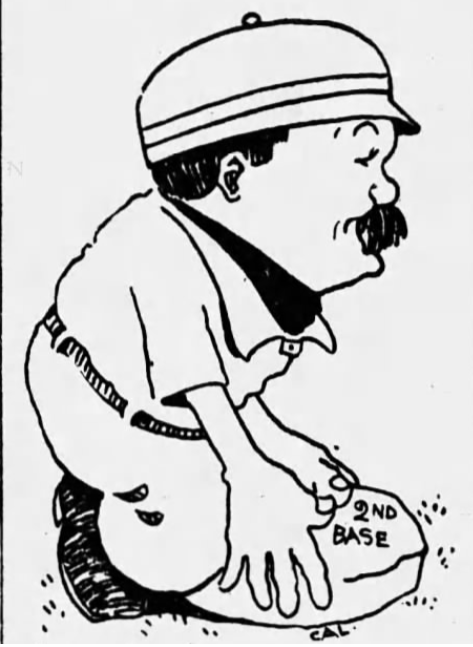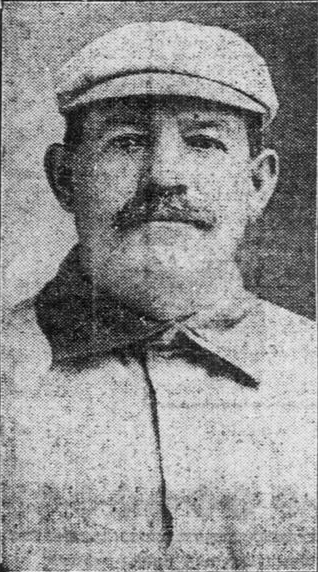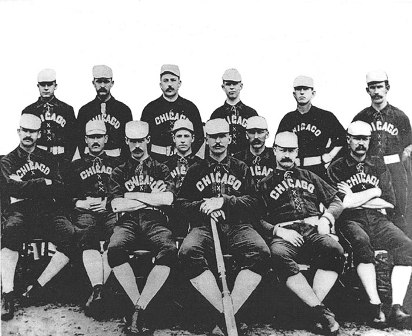After his off-season heroics, pulling an Altoona, Pennsylvania man from a fire, Piggy Ward, having been released by the Washington Senators, joined the Scranton Coal Heavers in the Eastern League for the 1895 season; The Scranton Times called him, “a very good man and will be heard from on the lines.”
He quickly became popular with his new club. The Scranton Tribune said:
“(He is) clearly a favorite with the unwashed bleacher—or, with the grandstand, for that matter…He is large bodied, somewhat round shouldered and looks awkward in repose. In action he is one of the quickest on the team and plays and steals bases with a vim and action that is refreshing.”
He hit .357—45 players with at least 200 at bats hit better than .300 that season in the Eastern League—The Sporting News said his manager found a way to get the most out of Ward:
“(Billy) Barnie gave him instructions to be in bed at least two nights a week. A little sleep and less booze and Ward is all right.”

Ward caricature, 1902
His “coaching” did not seem to change, and on several occasions, according to the Scranton newspapers, he was ordered off the field “for offensive coaching.” And he was unpopular in the other league cities.
After Ward was thrown out of a game with the Rochester Browns in the third inning, The Rochester Democrat and Chronicle said:
“’Piggy’ Ward, and rightly nicknamed is he.”
He was even less liked in Buffalo; The Courier said: “Ward is one of the most offensive coachers extant, and he would gain friends by bottling some of his exuberant flow of nonsense.” While The Enquirer was even less charitable:
“(H)is calliope-like voice is about as musical as a dynamite blast in a stone quarry. He evidently imagines he is pretty all right as a ‘kidder,’ but what he doesn’t know about being funny would fill several large volumes. Altogether as a joker, ‘Piggy’ is a rank, dismal, decided failure.”
The Tribune noted that the second baseman was a bit eccentric in other ways as well:
“Ward has a nondescript practice uniform which is a cross between the scant apparel of a Feeje [sic] islander and the hay-making garb of a farmer. It consists of a white negligee coat cut like a robe de chambre and reaching to the knees, a pair of loose trousers of the same color which reach to the shoe tops, a white cap and a sleeveless undershirt that is open to the waist.”
In 1896, Ward was again in Scranton, and he had vowed in the off season to be in the best shape of his life. In a letter to The Tribune he said he spent the winter “handling a pair of spirited mules,” and expected to report to Scranton weighing 185 pounds, down from his 217 the previous season. The paper said he appeared to have lost 20 pounds from the previous season upon his arrival.

Piggy Ward
Also, in 1896, his one-man “coacher” show became a two-man show when Arlie Latham, released by the St. Louis Browns in mid May, joined the Coal Heavers. The Springfield (MA) News was one of the rare league newspapers that thought it was good thing:
“With two such comedians…the Scranton team ought to prove a great drawing card on the circuit, The Springfield crowd are anxious for Scranton series here.”
Neither made it through the season, Latham was released July 17, Ward, one month later. When Ward signed with the Toronto Canadians, The Wilkes Barre Record said:
“Ward is a great batter and base runner. There we quit.”
The Wilkes Barre News said:
“(Ward) is just where he belongs on that gang of Toronto hoodlums.”
Al Buckenberger’s Canadians were considered to be the dirtiest team in the league, The Springfield Union said with the addition of Ward:
“The opponent that gets around first base now without being tripped is lucky to get past Piggy Ward in safety and is sure to be blocked or tripped at third by Jud Smith.”
After the 1896 season, some of the papers in the Eastern League cities suggested rules changes to eliminate Ward’s type of “coaching.” The Rochester Democrat and Chronicle said:
“The majority of ‘fans’ take as much delight in lively, witty coaching, such as has made Arlie Latham and Billy Clymer famous…There need not be anything offensive in aggressive work by men on the lines…but all players are not like Clymer (and Latham) and that big beast s like ‘Pig’ Ward make themselves obnoxious by their actions and language when in the coacher’s box.”
The Syracuse Herald suggested adopting a rule “ousting ‘Pig’ Ward and others of his ilk from the game entirely.”
Whether it was an attempt to improve his image or a function of playing on a smaller stage—with his hometown Lancaster Maroons in the Atlantic League and the Mansfield Haymakers in the Interstate League—Ward seemed to stay fairly quiet and avoid controversy among the press in the league cities from 1897 through 1899.
The 5’ 9” Ward seems to have played in his later years at between 220 and 230 pounds from various reports. Frank Rinn, who managed Ward for the three seasons in Lancaster talked to The Hartford Courant about him:
“Although he is heavy and sluggish Piggy has more ginger than a dozen ordinary players. Rinn was telling the other day how hard it was to get Ward to train…He was sent out to coach once and he pulled a cushion out from under his shirt and had a good seat on the ground.”
Ward bounced from no less than eight teams between 1900 and 1905, including playing for John McCloskey again—in 1902 in Pacific Northwest League with the Butte Miners—Ward stayed with the McCloskey for the entire season this time—winning a championship and receiving a gold watch and chain at season’s end for being voted by fans as the team’s most popular player in a promotion for a local jeweler. He also led the league with a .332 batting average; only seven players in the six-team Pacific Northwest circuit hit .300 or better that season.

Ward and Butte Miners teammate Thomas Kelly in 1903.
The Cincinnati Times Star, still not recovered from his tenure with the Reds nearly a decade earlier said of Ward winning the watch:
“The booby prize was the best Ward could have captured in a similar contest during his stay in this city.”
In 1903, Ward reverted to some of his old ways. With an already signed contract to return to Butte and a $100 advance in his pocket, he signed a contract and collected a $100 advance from the Portland Browns in the upstart Pacific Coast League. He ended up back in Butte, and when McCloskey left the club to manage the San Francisco Pirates, he told the Butte newspapers that Ward, who was already the team captain, was his choice to succeed him as manager; the club instead named shortstop Billy Kane manager.
When rumors swirled in 1905 that the cash-strapped Pacific National League might cut player salaries, The Spokane Chronicle said Ward tried to form a player’s union chartered by the American Labor Union which was formed in 1898 as the Western Labor Union to create a federation of mine workers. The rumored pay cuts never came, nor did the union.
Ward was reported to have died in January of 1906; the news made all the Philadelphia dallies and several other East Coast papers, and over the next month spread West. The papers had confused Piggy—Frank G. Ward—with Frank P. Ward, a former amateur player who had died in Newark, N.J.
Ward was seriously injured that same winter when working as an electrician; he was shocked and fell from a pole.
The news of his death—despite being corrected in the papers—and the accident, were enough to make many believe Ward had died. When he traveled to Chicago in August of 1911 for former teammate Charles Comiskey’s birthday, The Chicago Daily News said Comiskey was shocked to see Ward, “whom he thought was dead.”
The not-dead Ward did not play professionally in 1906—the Frank Ward who appeared with the Glens Falls-Saratoga Springs team in the Hudson River League—listed among Ward’s career statistics on Baseball Reference—is a different Frank Wad.
He was hired in 1907 as an umpire in the Northwestern League. The Butte News celebrated the move:
“’Piggy’ promises to be as popular an umpire as he was a player…He is firm, has a good voice, and is known to all the of the Northwest, and President (William Henry) Lucas made a 10-strike when he appointed him on the league staff.”
He lasted just two games. The Spokane Press said he:
“(B)roke down completely last night. This morning he was almost a nervous wreck. A collection was taken up among the ballplayers and he was sent back to his home in Scranton, Pennsylvania”
The paper said Ward’s wife had suggested he take the position because it might “build him up,” after the electrocution, but the stress was “too much for him.”
Four months after Ward’s reunion with Comiskey, The Pittsburgh Gazette Times said he was “near death,” a pitiable wreck,” suffering from “brain disease,” in an Altoona hospital.
Ten months later, on October 23, 1912, 45-year-old Piggy Ward died. The Altoona Tribune called him “one of the most famous diamond stars in the land,” and said:
“He possessed several expensive pins, a beautiful watch, and other jewelry presented to him by admirers when he was thrilling fandom with his feats.”
Tags: Al Buckenberger, Arlie Latham, Atlantic League, Billy Barnie, Billy Clymer, Butte Miners, Charles Comiskey, Cincinnati Reds, Eastern League, Frank Rinn, John McCloskey, Jud Smith, Lancaster Maroons, Pacific Coast League, Pacific National League, Pacific Northwest League, Piggy Ward, Rochester Browns, San Francisco Pirates, Scranton Coal Heavers, St. Louis Browns, Toronto Canadians, Washington Senators, William Henry Lucas























